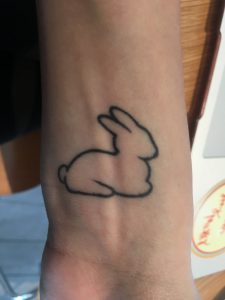My testimonia to Alchemies of Erasure:
I resonated extremely with the idea of being invisible because as a Latina woman, I am marginalized and often depreciated. My mother has always pushed education on me because unlike the privileges, entitlements, and chances I am stripped of because of who I am, nobody can ever rob me of my intellect. I have worked so hard to be where I am today. I have had to push past the stereotypes, stigmas, expectations, and limitations that this authoritarian society has put onto me. I knew that if I wanted to be released from the grips of society’s chains, I would need to do so through education. It is true that “when a woman has to be made invisible, it is because she is powerful, and her presence reverberates, touching everything in its path” (p. 167). I believe that because I have seen it with the many powerful women in my life: my abuela Mimi, my Titi Vivian, Titi Cookie, Titi Millie, my cousin Jessie, my cousin Elyse, and especially through my mother. These women have impacted my life in one way or another and have helped me become who I am today through their endless support, encouragement, and most importantly, through their incessant love. “Whether by her beauty, her spirit, her intellect, her capacity for loving, her conscious witnessing, her creative rebelliousness-called-madness, her liberating laughter, her voice-seeking-truth, her difference, she has not gone unnoticed” (p. 167) If not for them, I would not see the beauty within myself, understand the power of my intelligence, know the differences between right or wrong, nor understand the importance of lifting others up and loving others. I may be invisible to the world, to those who choose not to see me, but I know who I am and I know the power I hold. I think the hardest part of being invisible was trying to convince myself that I am worth so much more than stereotypes and negative connotations. I am an educated Latina woman, a learner and lover of life, someone who loves to laugh, I am a published poet, I love to write, and I love empowering others who have not yet escaped their invisibility. “The fearful ones will do anything to destroy what makes them cower” (p.167) Have you seen the news lately? Sally Yates, first a powerful woman, then the (now former, seriously?) attorney general, fired because she declined to defend something that she believed is and IS wrong. Are we supposed to silence our voices for your merrymaking? Angela Merkel, first powerful woman, then Chancellor of Germany, no handshake from Mr. Not My President. Are you afraid you might actually get a brain and some sense through a handshake? All I can say is, my invisibility has been forced onto me, but I have been fortunate enough and privileged enough to not succumb to any negative impositions placed onto me by those who still do not consider me, or my brothers and sisters to be 100% percent human. I will not be subjected to the ⅗ standard of my humanness. I am a whole being, an entire entity, an intelligent woman, a person. I ask that people open their minds and burn the invisibility cloaks; this is not a never-ending exhibition of Harry Potter, this is life. Be seen, be heard, be strong, be you.
